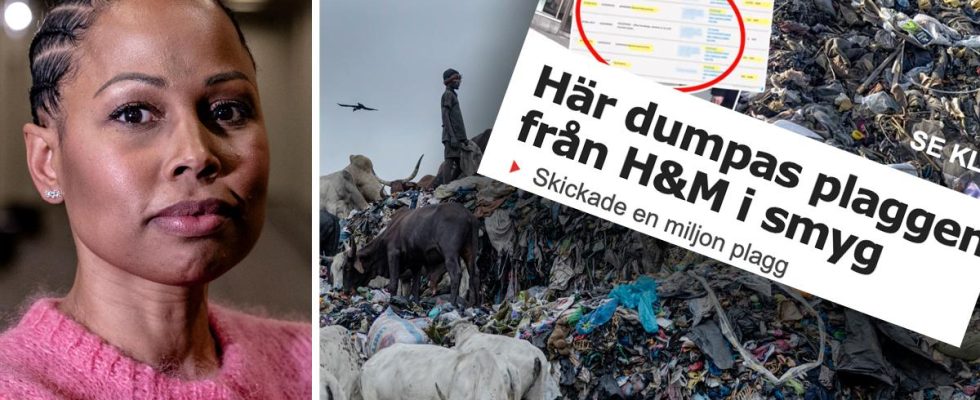unsaveSave
Aftonbladet’s revelations about the dark side of the fashion industry have left a mark on the EU’s political negotiations.
Now the EU Parliament wants to force the “fast fashion” chains to pay for their garbage.
– What we have decided today is a step in reducing the overproduction of clothing in the world, which is required if we are to get away from the reality you have revealed, says EU parliamentarian Alice Bah Kuhnke (MP).
Last year, Aftonbladet was able to reveal with the help of airtags how clothes that H&M promised to recycle are instead sent to countries such as Benin and Ghana, where they are often dumped or burned uncontrolled and where clothing waste has created an environmental disaster.
The report has attracted a lot of attention – also among politicians.
In recent months, the European Parliament has debated the issue of so-called extended producer responsibility, which will force the fashion chains to pay a sum for each garment sold that will make it possible to take care of it when it is thrown away.
expand-left
fullscreenBenin. Photo: Magnus Wennman
During the negotiations, Aftonbladet’s review was used as a means of pressure, says EU parliamentarian Alice Bah Kuhnke (MP).
– We in the green group have raised your review with other political groups, to strengthen our negotiating position and as further evidence of what is going on. This type of investigative journalism plays a very important role for us politicians, she says.
expand-left
full screen Alice Bah Kuhnke, EU parliamentarian for the Green Party. Photo: Andreas Bardell
Stop for garbage export
On Wednesday, the EU Parliament decided to introduce producer responsibility, states the European Parliament. A fixed amount, unclear how big, will be added to each garment sold.
– What we have decided today is a step in reducing the overproduction of clothing in the world, which is required if we are to get away from the reality you have revealed. At the same time, we receive funding for collection, recycling and reuse, says Alice Bah Kuhnke.
The idea is that you should not be able to export your rubbish under the pretense that it is second hand.
– This is a step in the right direction, even if much more is required, says Bah Kuhnke.
expand-left
fullscreenGhana. Cows forage for food on a mountain of textiles. Photo: Magnus Wennman
“Stands for human suffering”
She is critical of how the fashion industry – and the big fast fashion chains – conduct themselves today.
– The fashion industry is responsible for huge emissions and human suffering. Year after year, companies promise to improve. At the same time, sales and emissions continue to increase.
The issue of extended producer responsibility will now be forwarded to the European Council – i.e. the member states – for negotiations. The EU has already decided that from 1 January 2025 all countries will have mandatory collection of textile waste.
Liz Ricketts, co-founder of the environmental organization The Or Foundation in Ghana, believes that the proposal adopted by the EU Parliament is insufficient and that the basic understanding of the problem is lacking.
Better clothing sorting in Europe cannot solve the waste problem in Africa, she believes.
“Insufficient”
– The clothes that currently come to Kantamanto (ed. note a large clothing market in Ghana) have already been sorted as suitable for reuse and yet 40 percent leave the market as waste.
According to Ricketts, fast fashion has erased the value of second-hand clothing and she now wants EU policy to focus on reducing global clothing manufacturing.
The fashion chain H&M welcomes the EU Parliament’s decision in a comment to Aftonbladet:
“We are positive about ambitious legislation at EU level linked to this area and we have long been in dialogue with decision-makers regarding this. We believe that the EPR legislation can help the industry take steps forward in reusing and recycling textile waste and we look forward to the next step in the process.”
